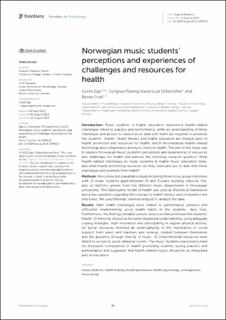| dc.contributor.author | Ege, Grete | |
| dc.contributor.author | Ottemöller, Fungisai Puleng Gwanzura | |
| dc.contributor.author | Frisk, Bente | |
| dc.date.accessioned | 2023-09-22T12:18:47Z | |
| dc.date.available | 2023-09-22T12:18:47Z | |
| dc.date.created | 2023-09-17T18:24:22Z | |
| dc.date.issued | 2023 | |
| dc.identifier.citation | Frontiers in Psychology. 2023, 14 . | en_US |
| dc.identifier.issn | 1664-1078 | |
| dc.identifier.uri | https://hdl.handle.net/11250/3091393 | |
| dc.description.abstract | Introduction: Music students in higher education experience health-related challenges linked to practice and performance, while an understanding of these challenges and access to resources to deal with them are required to promote the students´ health. Health literacy and health education are integral parts of health promotion and resources for health, which encompasses health-related knowledge and competence aiming to improve health. The aim of this study was to explore Norwegian music students’ perceptions and experiences of resources and challenges for health and address the following research question: What health-related challenges do music students in higher music education meet, and what health promoting resources do they need and use to deal with these challenges and promote their health?
Methods: We conducted a qualitative study including three focus group interviews with 13 music students aged between 19 and 31 years studying classical, folk, jazz or rhythmic genres from five different music departments in Norwegian universities. The Salutogenic model of health was used as theoretical framework and a few questions regarding the concept of health literacy were included in the interviews. We used thematic network analysis to analyze the data.
Results: Main health challenges were related to performance pressure and difficulties implementing good health habits in the students` daily lives. Furthermore, the findings revealed several resources that promoted the students’ health: (1) Personal resources included situational understanding, using adequate coping strategies, high motivation and participating in regular physical activity. (2) Social resources involved an understanding of the importance of social support from peers and teachers and synergy created between themselves and the audience through sharing of music. (3) Environmental resources were linked to access to good rehearsal rooms. The music students expressed a need for increased competence in health promoting routines during practice and performance and suggested that health-related topics should be an integrated part of education. | en_US |
| dc.language.iso | eng | en_US |
| dc.publisher | Frontiers Media | en_US |
| dc.rights | Navngivelse 4.0 Internasjonal | * |
| dc.rights.uri | http://creativecommons.org/licenses/by/4.0/deed.no | * |
| dc.title | Norwegian music students’ perceptions and experiences of challenges and resources for health | en_US |
| dc.type | Peer reviewed | en_US |
| dc.type | Journal article | en_US |
| dc.description.version | publishedVersion | en_US |
| dc.rights.holder | © 2023 Ege, Ottemöller and Frisk | en_US |
| dc.source.pagenumber | 0 | en_US |
| dc.source.volume | 14 | en_US |
| dc.source.journal | Frontiers in Psychology | en_US |
| dc.identifier.doi | 10.3389/fpsyg.2023.1199423 | |
| dc.identifier.cristin | 2175819 | |
| dc.source.articlenumber | 1199423 | en_US |
| cristin.ispublished | true | |
| cristin.fulltext | original | |
| cristin.qualitycode | 1 | |

